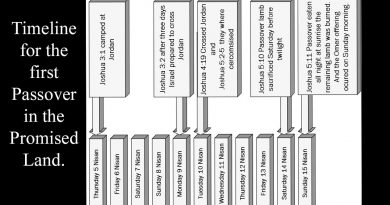Israel Saturday Egypt Exodus Triangulation
The day of the week for the Exodus can be narrowed down by considering the research for finding the first Sabbath after the manna started. The first Sabbath after manna started falling was on the 21 or 22 day of the second month of the Hebrew year called Ziv. The Passover occurs on the evening of the fourteenth day of the first month of the Hebrew calendar called Nisan. The only thing not known is if there were 29 days or 30 days in the month of Nisan, the year that Israel exited Egypt. Considering these facts, two variables for the month of Nisan and two variables for Ziv appear. By calculating all possible combinations of these four variables, there are four different possible calendar templates from the first Passover to the first Sabbath. The four different calendar templates calculate only three different days of the week for the Exodus.
If one calculates the first Sabbath after the manna fell to be 22 Ziv, they will subtract 29 days from that—or 30 days if the month was longer. When calculating only 29 days for the month of Nisan, the Passover occurred on Thursday evening and the Exodus on a Friday morning. If 30 days, then the Passover happened on a Wednesday night with the Exodus happening on a Thursday morning.
If one calculates the first Sabbath after the manna started to be 21 Ziv, then 29 days means the Passover happened on a Friday night and the Exodus on a Saturday morning. If 30 days, then the Passover would have happened on Thursday night and the Exodus on Friday morning.
By considering the first Sabbath after the manna began to fall, the days of the week the Exodus occurred can be narrowed down to three potential days: Thursday, Friday, or Saturday.
These possibilities can be further narrowed down to one single day. The Bible does not relate Thursday or Friday to Israel’s Exodus from Egypt. However, the Bible links the Exodus from Egypt to Saturday, the Sabbath. The Bible informs us that Israel, the people that God sanctified, is interlinked with Saturday, which God sanctified.
God sanctified two crucial things in the Old Testament. The word “sanctified” means to set aside. God set aside both the last day of creation (Genesis 2:3) and the tribe of Israel (Exodus 20:8). The use of the word “sanctified” was used for both the creation on the seventh day and for all of Israel.
Both the sanctified day and sanctified people are combined in the remembrance of the Exodus from Egypt:
Exodus 31:12-17 – And Jehovah spoke unto Moses, saying, Speak thou also unto the children of Israel, saying, Verily ye shall keep my Sabbaths: for it is a sign between me and you throughout your generations; that ye may know that I am Jehovah who sanctifieth you. Ye shall keep the Sabbath therefore; for it is holy unto you: every one that profaneth it shall surely be put to death; for whosoever doeth any work therein, that soul shall be cut off from among his people. Six days shall work be done; but on the seventh day is a Sabbath of solemn rest, holy to Jehovah; whosoever doeth any work on the Sabbath day, he shall surely be put to death. Wherefore the children of Israel shall keep the Sabbath, to observe the Sabbath throughout their generations, for a perpetual covenant. It is a sign between me and the children of Israel for ever: for in six days Jehovah made heaven and earth, and on the seventh day he rested, and was refreshed.
Deuteronomy 5:12-15 – Observe the Sabbath day, to keep it holy, as Jehovah thy God commanded thee. Six days thou shalt labor, and do all thy work; but the seventh day is the Sabbath unto Jehovah thy God: in it thou shalt not do any work, thou, nor thy son, nor thy daughter, nor thy man-servant, nor thy maid-servant, nor thine ox, nor thine ass, nor any of thy cattle, nor thy stranger that is within thy gates; that thy man-servant and thy maid-servant may rest as well as thou. And thou shalt remember that thou was a servant in the land of Egypt, and Jehovah thy God brought thee out thence by a mighty hand and by a stretched out arm: therefore Jehovah thy God commanded thee to keep the Sabbath day.
Why would God command Israel to remember their slavery in Egypt on a different day of the week other than the day they exited Egypt? The fact that both the sanctified day and the people are intertwined down to the same day gives credibility to the fact that both events occurred on the same day of the week.
Deuteronomy 5:15 – Remember that thou was a servant in the land of Egypt, and Jehovah thy God brought thee out thence by a mighty hand and by a stretched out arm: therefore Jehovah thy God commanded thee to keep the Sabbath day.
The fact that Israel, the Exodus, and the Sabbath are intertwined so much that they cannot be separated would indicate a high probability that the Exodus took place on a Saturday. The odds of the calendar allowing for a Saturday morning Exodus is 1 in 7—that is, for every seven years, one year would line up with this account. If calculated in conjunction with the first Sabbath after the manna started, the odds are 1 in 3.

